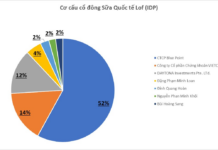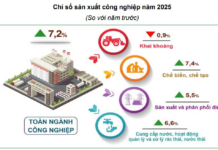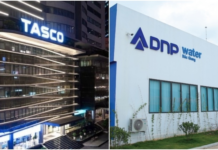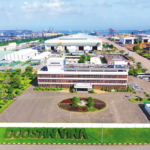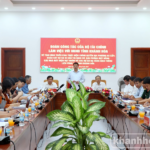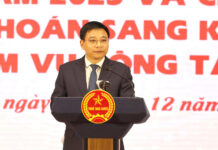Amid the growing urgency for clean energy, the peaceful nuclear cooperation between Russia and Vietnam is entering a new phase marked by significant milestones.
On September 26th, during the World Atomic Energy Week in Moscow, Rosatom International Network (REIN JSC, a subsidiary of Russia’s State Atomic Energy Corporation Rosatom) and Power Engineering Consulting Joint Stock Company 2 (PECC2, under Vietnam Electricity – EVN) signed a Memorandum of Understanding (MoU) for the Ninh Thuan 1 Nuclear Power Plant project.
This MoU aims to strengthen collaboration between Russia and Vietnam in updating feasibility studies, site documentation, and developing infrastructure and human resources for the Ninh Thuan 1 Nuclear Power Plant – Vietnam’s first-ever nuclear power project, marking the revival of Vietnam’s nuclear power program after nearly a decade-long hiatus.
“Vietnam-Russia Nuclear Cooperation Progressing Excellently”
“Nuclear energy cooperation between Vietnam and the Russian Federation is progressing excellently. Recently, Vietnam has restarted its nuclear power program and begun close coordination with Rosatom.” – Dr. Tran Chi Thanh, Director of Vietnam Atomic Energy Institute, stated in an interview with Sputnik (Russia) on the sidelines of the World Atomic Energy Week.
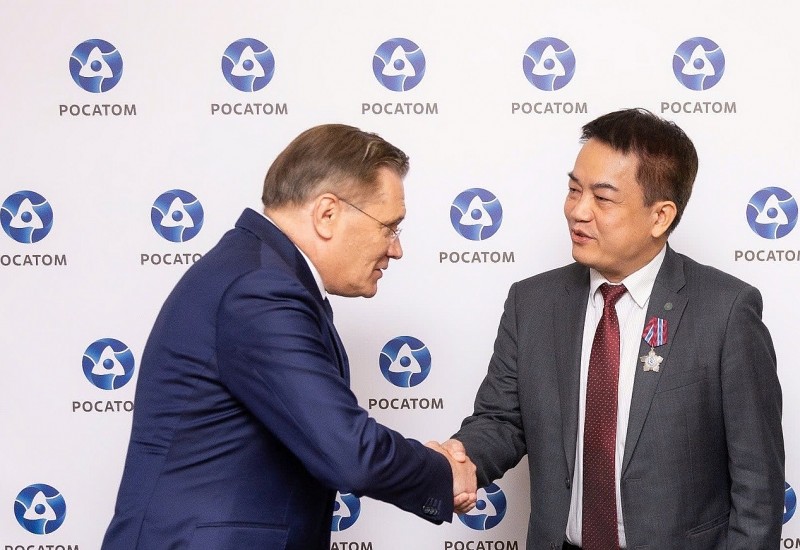
Rosatom Director General Alexey Likhachev (left) and Dr. Tran Chi Thanh, Director of Vietnam Atomic Energy Institute. Photo: VGP
Earlier, in May 2025, Vietnam’s Minister of Science and Technology Nguyen Manh Hung and Rosatom Director General Alexey Likhachev signed the Inter-Ministerial Roadmap for Nuclear Technology Development by 2030.
This roadmap includes key initiatives: Establishing the Nuclear Science and Technology Center; supplying fuel for the Da Lat research reactor; Vietnam’s participation in the “International Research Center based on the MBIR reactor” consortium; and developing a skilled workforce for Vietnam’s nuclear energy sector.
MBIR stands for Multipurpose Fast Neutron Research Reactor, developed by Rosatom. It is a versatile fast-neutron reactor using sodium as a coolant, designed to support research on Generation IV (Gen IV) nuclear technologies – safer, more efficient, and sustainable reactor designs.
MBIR is not a commercial power-generating reactor but a research tool for testing new fuels, materials, and cooling systems.
The MBIR reactor is under construction at the Research Institute of Atomic Reactors in Dimitrovgrad, Ulyanovsk region, southwestern Russia, with an expected operational date in 2028.
The Ninh Thuan 1 and 2 Nuclear Power Plants (part of the Ninh Thuan Nuclear Power Project) with a combined capacity of 4,000–6,400 Megawatts are not only technological landmarks but also crucial for national energy security, contributing to clean electricity production and Vietnam’s Net Zero goal by 2050.
In early 2025, Prime Minister Pham Minh Chinh mandated the completion of the Ninh Thuan nuclear power project by December 31, 2030, emphasizing its role as a “solution to energy security challenges,” gradually replacing coal-fired power and reducing supply disruption risks.
In mid-September 2025, Wood Mackenzie highlighted that Vietnam will lead nuclear energy development in Southeast Asia, with plans to expand capacity as early as 2030, as ASEAN economies actively pursue this clean, low-carbon energy source.
Global Shipbuilding Giant Acquires Vietnam’s Dung Quất Plant in $210 Million Deal to Transform Seawater into Fresh Water for the Middle East
After nearly two decades of operation, the Doosan Vina heavy industry plant has officially been acquired by its new owner, HD Hyundai Group.
Vietnam’s Trillion-Dollar State Conglomerate Eyes $24 Billion Investment in Renewable Energy for Can Tho
PetroVietnam stands as the single largest contributor to the national budget, delivering a staggering 77.4 trillion VND in fiscal year 2024. Remarkably, its contribution surpasses the combined total of the 100 companies ranked from 101 to 200.











